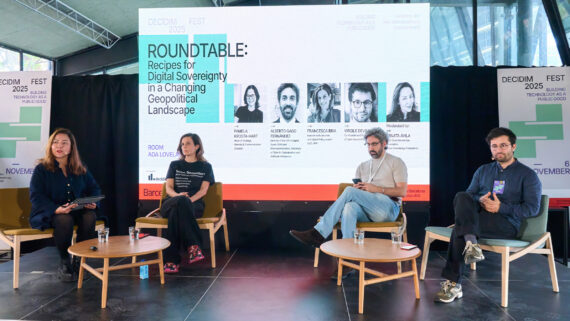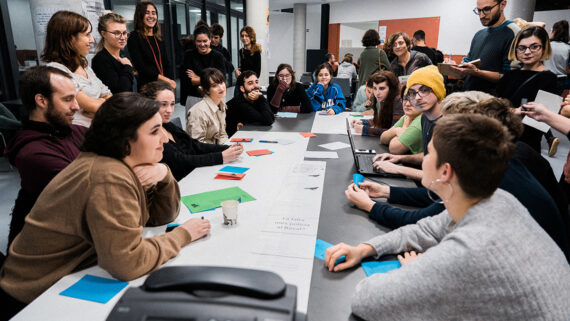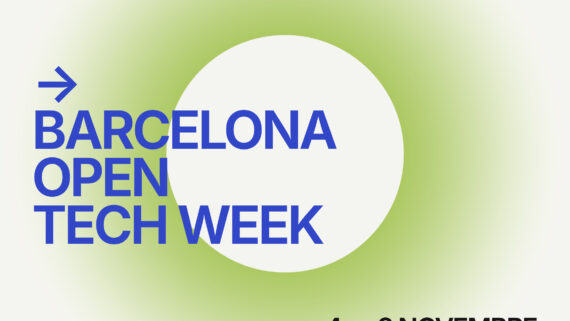
If you thought that Decidim was only used in the context of local governments, you will be surprised! At Decidim Fest 2023, we travel through different contexts and realities in which Decidim has found a home and has changed the way people interact with power and decision-making. We'll show you!
The talk ‘Decidim Stories: Use Cases Beyond Cities’ took us on an exciting journey through three inspiring Decidim experiences in different contexts, from the federal government of Brazil to projects dedicated to migrant participation in Europe, or an initiative actively engaging the Guipuzkoa community in shaping its destiny in 2030.
Let’s Decide Brazil: Opening minds, building public infrastructure
Brasil Participativo has adopted Decidim as a revolutionary tool to boost citizen participation throughout the country. As the platform expands beyond its local government origins, Brazil has embraced this technology to empower its citizens and give them a voice in decision-making
62% of users in Brazil exclusively use the Internet on their mobile phones. This is why Decidim in Brazil has become the leading digital platform of a movement that brings people of all ages and backgrounds together, united by the desire to influence the direction of their community and country. Through this platform, citizens can submit proposals, discuss important issues, and actively participate in the construction of a more participatory and democratic Brazil.
Carla de Paiva Bezerra, Director of Digital Participation and Network Communication in the Brazilian government, shared with us how Decidim has become an ally in Brazil to promote active community participation: with public digital infrastructure. The data is hosted on public servers and is accessed with digital IDs used by 140 million Brazilians.
How do they do it? That ‘Brasil Participativo’ becomes the leading digital platform has been made possible thanks to financial resources. Out of the 27 states that make up Brazil, representation from all communities has been achieved through contact with local leaders of social movements. Furthermore, they have also employed a strategy involving influencers from various fields. Through citizen proposals, open debates on critical topics, and active participation where everyone can vote and support the proposals they consider most important. Transparency ensures accountability to the citizenry.
The result? 1,419,729 registered users on the platform and 8,254 proposals that have received 1,529,826 votes, of which the most voted ones have been incorporated into the multi-year plan that will be put to a vote in December and will come into effect starting in 2024. Additionally, in December, they will hold the 4th National Youth Conference and the 6th National Food and Nutritional Security Conference. Both have had a digital component with proposals presented and voted on within the platform.
EMVI Project: Empowering migrant voices in anti-racist policies
The political participation of migrants and their descendants is fundamental for the well-being of modern societies. Promoting a more diverse society on a democratic basis is in line with the fundamental values of the European Union; the Charter of Fundamental Rights emphasizes that ‘the European way of life is inclusive.’
However, European societies have not yet fully realized their promised commitment to political anti-racism and full diversity, as migration is still closely linked to discrimination. One of the main objectives of the EMVI Project is to raise awareness among host societies about the importance of political participation for all groups.
Daryna Sterina, project coordinator in Germany, and Romy Grasgruber-Kerl, founder in Austria, explained to us how Decidim has played a crucial role in Austria, Germany, Greece, Italy, and Slovenia, enhancing the participation of migrants in the design and implementation of policies that affect them
How do they do it? Through three fundamental pillars: increasing the participation of migrants, especially women, as active agents in defining inclusive policies; identifying best practices by creating support groups among migrant organizations, NGOs, and other strategic actors to address local needs; tailored training sessions (online and in-person) to promote transnational exchange among individuals.
The result? They have established and improved local advisory bodies for migrants in the 5 countries and adapted the platform to 15 languages. They have conducted informational sessions to promote the use of Decidim, published 5 national research reports and 1 best practices guide on effective participation tools, with 10 online learning modules available as open educational resources. Additionally, they have created a direct assistance hotline for individual follow-up with training participants
Gi230: Towards a Collective Future for Guipuzkoa
Everything began when the Provincial Council of Gipuzkoa proposed a journey to the year 2030 to a group of researchers from the University of the Basque Country/Euskal Herriko Unibertsitatea (UPV/EHU). They envisioned a better future for their territory and, to achieve it, invited the entire society of Gipuzkoa to generate it in a participatory and collaborative manner.
The Gi2030 platform is a laboratory where ideas grow and is an important and crucial step towards a more aware, inclusive, and resilient Gipuzkoa, working to address the challenges that the future presents in terms of social, digital, ecological transition, and collaborative governance.
Antonio Casado da Rocha, a researcher at UPV/EHU and a member of Zehar+, explained to us the experience with Gi2030, where Decidim is a key tool for driving significant changes. They do this with the involvement of research personnel, the cooperative Colectic, which advises and supports the technical and strategic design and implementation of the process; the agency Komunikatik, which handles communication and marketing; and collaboration with strategic partners such as Arantzazulab, Sorland, Medialab-Tabakalera, Deliberativa, BC3, and the Decidim.org team.
How do they do it? In the first year of its journey, this hybrid participatory project has consisted of 5 phases during the first seven months of its evolution, from January to December 2023. A collective effort with agents and allied individuals on various topics to create spaces and proposals.
The result? 13 in-person workshops with citizens, students, and research staff on the Gipuzkoa campus that have generated 116 elaborated questions associated with the challenges of the Agenda 2030, with the help of over 300 participants and improved into 10 finalist proposals on the platform. Workshops with influential groups and individuals in the towns, 2 cultural events, rounds of consultation with 29 experts and experienced agents in social, digital, and green transition. They are now in the final stages of the process planned for this year, where Decidim opens the opportunity for any interested individual or organization to submit proposals.







